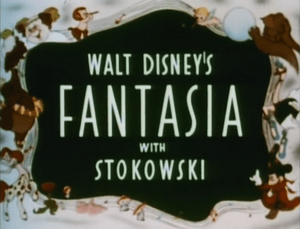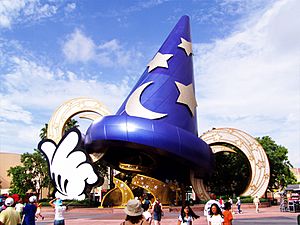Fantasia (movie) facts for kids
Quick facts for kids Fantasia |
|
|---|---|

Title screen in the original theatrical trailer
|
|
| Produced by | Walt Disney |
| Starring | Leopold Stokowski Deems Taylor The Philadelphia Orchestra Walt Disney (voice) |
| Studio | Walt Disney Productions |
| Distributed by | RKO Radio Pictures, Inc. |
| Release date(s) | February 29, 1940 |
| Running time | 124 minutes |
| Language | English |
| Budget | $2,280,000 (est.) |
| Money made | $76,408,097 |
Fantasia is a classic animated movie made by Walt Disney Productions. It was the third animated film they ever made. It first came out on February 29, 1940. Unlike other Disney movies at the time, it was released by Disney itself, not by RKO Pictures. RKO usually distributed Disney films from Snow White and the Seven Dwarfs to Peter Pan.
Fantasia is special because it combines animation with eight famous pieces of classical music. For example, one part uses music from Igor Stravinsky's The Rite of Spring. This section shows the story of life on Earth, from its very beginning up to the time when dinosaurs disappeared!
A sequel to this movie, Fantasia 2000 (1999), was released on December 17, 1999, in New York.
Contents
Exploring the Music and Animation of Fantasia
Fantasia begins with live-action scenes. You see members of an orchestra gathering and tuning their instruments. The master of ceremonies, Deems Taylor, then introduces the show.
Here are the amazing musical pieces and animated stories you'll find in Fantasia:
Toccata and Fugue in D Minor
This segment uses Toccata and Fugue in D Minor by Johann Sebastian Bach. You'll see live-action shots of the orchestra. These scenes then blend into abstract patterns. Animated lines, shapes, and clouds move and change with the music.
The Nutcracker Suite
This part features music from Nutcracker Suite by Pyotr Ilyich Tchaikovsky. The animation shows the changing seasons, from summer to autumn to winter. You'll see different dances with fairies, fish, flowers, mushrooms, and leaves. Some of the famous dances include "Dance of the Sugar Plum Fairy" and "Waltz of the Flowers."
The Sorcerer's Apprentice
This segment uses The Sorcerer's Apprentice by Paul Dukas. It's based on a poem by Johann Wolfgang von Goethe. In this story, Mickey Mouse plays a young apprentice to a sorcerer named Yen Sid. Mickey tries some of his master's magic tricks. But he soon finds out he can't control them!
The Rite of Spring
This section uses music from Rite of Spring by Igor Stravinsky. It shows a visual history of Earth's early days. The story goes from the planet forming to the first living creatures appearing. Then, it shows the time when dinosaurs ruled and their eventual extinction.
Intermission and Meet the Soundtrack
After "The Rite of Spring," there's a short break. The orchestra musicians leave, and the Fantasia title appears. When they return, there's a fun jam session of jazz music. Then, the movie shows a cool demonstration of how sound works in films. An animated "soundtrack character" changes shapes and colors based on the sounds played.
The Pastoral Symphony
This part uses The Pastoral Symphony by Ludwig van Beethoven. It shows a mythical world from ancient Greece and Rome. You'll see colorful centaurs, cupids, fauns, and other creatures. They gather for a festival to honor Bacchus, the god of wine. But then, Zeus, the king of the gods, creates a storm! He even has Vulcan make lightning bolts for him to throw.
Dance of the Hours
This segment is a funny ballet using Dance of the Hours by Amilcare Ponchielli. It has four parts:
- Madame Upanova and her ostriches dance in the morning.
- Hyacinth Hippo and her helpers dance in the afternoon.
- Elephanchine and her bubble-blowing elephants dance in the evening.
- Ben Ali Gator and his alligators dance at night.
In the end, all the characters dance together until their palace falls apart!
Night on Bald Mountain and Ave Maria
This final section combines two pieces: Night on Bald Mountain by Modest Mussorgsky and Ave Maria by Franz Schubert. At midnight, the devil Chernabog wakes up. He calls evil spirits and restless souls from their graves to Bald Mountain. The spirits dance and fly until they are driven away by the sound of a bell as dawn arrives. Then, a chorus sings Ave Maria. You see robed monks walking with torches through a forest and into the ruins of a cathedral.
Images for kids
-
Leopold Stokowski conducted the film's score.
-
Deems Taylor was the film's Master of Ceremonies, who introduced each segment in live-action interstitial scenes.
 | Delilah Pierce |
 | Gordon Parks |
 | Augusta Savage |
 | Charles Ethan Porter |









